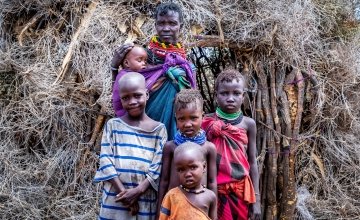
Knowledge Hub
Concern Worldwide escalates its operations in drought-stricken Kenya as child malnutrition levels soar

Concern Worldwide is ramping up its operations in drought-stricken Turkana in northern Kenya, in response to extremely critical levels of malnutrition among young children and predictions that these levels will remain high for the coming months.
Turkana, in north-western Kenya, has experienced drought conditions since 2017. The Kenyan Ministry of Health estimates that over 78,000 children aged under-five are malnourished in the county, with almost 19,000 of these severely malnourished.
The Food and Agriculture Organisation (FAO) estimates that up to two million people in Kenya currently need food as a result of the lack of rain. The latest rainy season has just ended with below average rainfall and no further rain is due until the next wet season in October. Acute malnutrition levels are expected to remain high until then, the Kenyan Ministry of Health has warned.
The drought has taken a severe toll on the pastoralist families living in Turkana who depend on their goats for milk and meat. Mother-of-nine Ng’ikaro Ekiru once had 100 goats but now has just five following the successive droughts. The lack of rain means they are not currently producing milk. Three of her children are severely malnourished. She is feeding them fruit from local bushes and has resorted to roasting the animal hides she was using as mats in her hut to feed her family.
If I do not get help from the government and partners like Concern, definitely I am going to perish.
As part of its expanded operations Concern is supporting 36 mobile health clinics for malnourished children and pregnant mothers, in some of the most remote and hardest hit parts of the county.
In addition, it is launching a direct cash transfer system for almost 5,500 households. The cash will enable them to buy food and other essential items to survive the current drought.

Alarming malnutrition
“The levels of malnutrition across Turkana are alarming,” Concern’s Kenya Country Director Amina Abdullah said. “By moving out to reach people in their communities, providing cash support to households most in need and therapeutic support to young, malnourished children, we are targeting those in greatest need.”
Concern’s Jason Kennedy, who recently returned from Turkana, recounted the scale of the need he witnessed: “It was heart-breaking watching fatigued children wait to receive their therapeutic food, mouths open and barely there. Once they received their dosage, it was like a complete character change. You could see their personality come out and they seemed a lot more alert and reactive to the world around them. But I never saw them play, which is something every child should be able to do. They seemed to know to save their energy, since it may be days until they eat again.”
Parents - mainly mothers - are waiting for days so their children can be treated for malnutrition and given therapeutic food, he said. “The location of our outreach posts are chosen so that they can be accessed by the people most in need, but for many, this still means a trek,” he added.
“When parents at these posts were asked what dreams they had for their children, they didn't say prosperity. They simply wished that their children would survive and be healthy. Many that we spoke to feared their children would die if they didn't receive help soon.”
Families are living in the most isolated and arid areas imaginable with very limited access to food, he said. Many live on hills and inclines, so when it rains, not alone do they get wet inside their straw huts, but their few possessions are at risk of being washed away.
“There is irrefutable evidence that the shrinking timeframes between major droughts in the region is the result of climate change,” Jason said. “Yet again, this is a case of people who are least responsible for climate change being affected the worst,” he added.
For more information or interviews, please contact Siobhan Sheerin, Senior Communications Officer on [email protected] or 020 7801 1046
Our impact in 2024
people reached, in 27 of the world's most fragile places
people supported in 50 emergencies
people reached through our health and nutrition programmes





